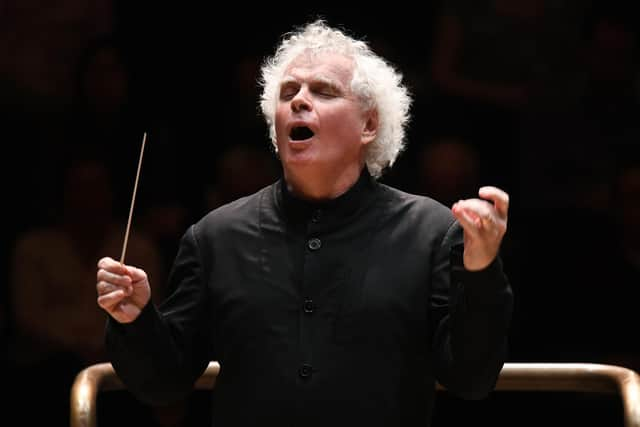Edinburgh International Festival music reviews: London Symphony Orchestra | Clara-Jumi Kang
London Symphony Orchestra ****
Usher Hall
It’s almost 20 years since Nicola Benedetti won BBC Young Musician of the Year playing Szymanowski’s Violin Concerto No 1 at the Usher Hall. On Wednesday evening she brought him back, this time not playing but as part of the first EIF under her directorship.
A very different kind of Szymanowski to the fantasy-like violin concerto, his Stabat Mater sets, in Polish, the ancient text telling of Mary’s grief as she stands by the cross of Christ after his crucifixion. Filling it with mournful pathos, Edinburgh Festival Chorus and London Symphony Orchestra, conducted by soon to depart Music Director, Simon Rattle, brought a sense of deep soul-searching to the six movements, spearheaded by a trio of soloists, most notably glorious Polish soprano Iwona Sobotka.
Advertisement
Hide AdAt times, the sotto voce approach to the chorus singing was almost too quiet, yet brought expressive commitment to the words of the hymn right through to the exquisite final moment of paradise.
Reflective of EIF’s theme, Hope in the Face of Adversity, Brahms’ Ein Deutsches Requiem heard the Chorus in fuller voice and on surer ground. Sopranos soared beautifully as joy appeared from time to time in the dark tunnels of loss, with the pointed accents of For All Flesh is As Grass, first heard in the double basses, echoed across the whole choir.
Like Szymanowski, Brahms takes a Latin text and translates it into a modern language. Not only is his Requiem in German, but the focus is more on the living than the dead.


While baritone Florian Boesch sounded not entirely at home in the Szymanowski, the Requiem gave opportunity for more legato singing, working at one with the way Rattle paced the whole piece, building it up layer by layer across instruments and voices until death is overcome by victory.
Carol Main
Clara-Jumi Kang ****
Queen’s Hall
There’s something disconcerting about discovering an entirely bare, unadorned stage: no chairs, no music stands, nothing to indicate that a musical performace is about to take place.
And there was something disarmingly raw and direct, even naked, about South Korean violinist Clara-Jumi Kang’s remarkable solo recital, too – just her, her violin, and a whole cascade of dashing notes, breathtakingly fluent effects and kaleidoscopic figurations, played entirely from memory.
Advertisement
Hide AdKang’s immaculate technical delivery is unquestionable: in the Bach Second Partita with which she began her recital, the rippled nimbly through the composer’s running lines, and teased apart his double-stopped counterpoint with expert ease.
She made light work, too, of the fiendish technical challenges of the three Ysaÿe sonatas after the interval. She played as if she meant every note, too – but there was a driven, determined quality to her performance that sometimes meant she missed out on aspects that were straightforwardly lyrical.
Advertisement
Hide AdThe magical sunrise that opens Ysaÿe’s Fifth Sonata was breathtakingly vivid, but it felt a bit short on the joy and wonder that really makes it special. Likewise, the notorious Chaconne that ends Bach’s Second Partita (quite a lot to assimilate at 11.30 in the morning) felt like an essay in grit and dedication, its repeating bassline a symbol of unwavering determination rather than inexorable fate. Nonetheless, a staggeringly talented performer.
David Kettle